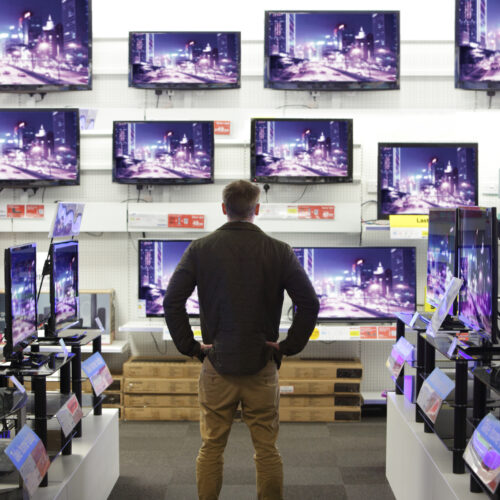Apple's busy 2024 included AI, new iPhones, antitrust issues, and a tough time in China

Chris Jackson/Getty Images
- Apple launched new products in 2024, including the Vision Pro and AI-powered iPhone 16.
- It faced challenges in China with iPhone sales and antitrust issues in the US and Europe.
- Apple also introduced Apple Intelligence at WWDC, marking its entry into the GenAI market.
It's been an eventful year for Apple.
The tech giant launched a brand new hardware product, made its official entrance into generative artificial intelligence, and added a new iPhone generation — all in the span of 12 months.
It's also faced questions about CEO succession, challenges in one of its largest markets, and criticism about being behind in the AI arms race compared to some of the industry's fiercest players. Meantime, it's been under antitrust scrutiny from both US and EU authorities.
"2024 has been a year of notable highs and lows for Apple as it expanded into mixed reality and AI while navigating shifting consumer preferences and market dynamics," Jacob Bourne, tech analyst at Business Insider's sister company EMARKETER, said.
Apple got off to a rocky start this year. Its stock got two analyst downgrades in early January, with bankers citing worries about poor iPhone sales in China. Still, it celebrated wins in the services department of its business and partnered with OpenAI to bring ChatGPT to new iPhones. It explored new territory with the Apple Vision Pro and upgraded company staples, including iPads and AirPods.
Here's a look back at Apple's 2024.
There was trouble in China

Fu Tian/China News Service/VCG via Getty Images
Apple started 2024 with struggles in its important Greater China region — a trend that continued. Analysts called sales of the iPhone 15 in China "lackluster" as competitors like Huawei and Xiaomi stepped up their competition in the local smartphone market.
It showed throughout Apple's earnings in 2024. Although the company beat revenue estimates in its fiscal fourth-quarter, sales in China missed and dropped year over year.
Still, Apple CEO Tim Cook said there are "positive signs" in the region during the fiscal Q4 earnings call on October 31. Cook took frequent trips to China this year — at least three times, as of November — amid fears that Donald Trump's potential tariffs will affect the country that makes a majority of Apple's iPhones, AirPods, Macs, and iPads.
"China's just been a disappointment in '24, full stop," Gene Munster, managing partner at Deepwater Asset Management, said.
Apple launched the Vision Pro in February

Anadolu/Getty Images
Apple launched its first headset, the Vision Pro, in February. The mixed reality device retails for $3,500, making it one of Apple's priciest products to date.
The headset was met with mixed reactions. Its uses are limited, and it was unclear if the tech was for gamers or professionals. Months after it released, Cook told The Wall Street Journal that the Vision Pro is for "people who want to have tomorrow's technology today."
"At $3,500, it's not a mass-market product," Cook said. "Right now, it's an early-adopter product."
Apple is reportedly slowing down its Vision Pro production and is instead eyeing a more affordable version of the headset.
It was hit with a DOJ lawsuit in March
The US Department of Justice accused Apple of maintaining an illegal monopoly on the smartphone market in an antitrust lawsuit. The DOJ alleged the iPhone maker was involved in "delaying, degrading, or outright blocking" rival technology. Apple denied the allegations.
The suit said the company "repeatedly responded" to competitive threats by "making it harder or more expensive for its users and developers to leave than by making it more attractive for them to stay."
Apple asked a federal judge to dismiss the lawsuit in August, saying the government's argument includes speculation. US District Court Judge Julien Xavier Neals will have to decide whether or not the case will go to trial.
Neals' decision could come as early as January, Bloomberg reported.
Meanwhile, in Europe, Apple was fined about $2 billion related to its App Store and was subject to other competition concerns in the region.
Apple rolled out new iPads

Apple; Business Insider
As OpenAI, Google, and others announced updates and demonstrated the power of their new AI assistants, Apple introduced new iPads in May.
The latest iPad Pro models are the first to have OLED display; Cook and Co. unveiled them at Apple's "Let Loose" event. Cook said it was "the biggest day for iPad since its introduction."
Although the launch came as Apple watchers waited for a bigger AI announcement, iPads performed well for Apple in Q3.
Apple Intelligence was finally introduced at WWDC

Apple
The world was introduced to Apple Intelligence at the annual Worldwide Developers Conference in June.
Apple's official debut into the AI wars, which have escalated since OpenAI launched ChatGPT in 2022, was the "biggest story" of the year, William Kerwin, a technology analyst at Morningstar, said.
The hype around Apple Intelligence was instant. Dan Ives, global head of technology research at Wedbush Securities, said it would usher in a "golden upgrade cycle" for iPhones. Apple said it'd be a big part of the iOS 18 software update too, though Apple Intelligence is only available on iPhone 15 Pro models or later.
The company made some lofty promises at WWDC, and plans to deliver on them after the initial rollout in October and through 2025, although not all the features touted have launched yet. So far, US iPhone users have gotten access to "Writing Tools," AI-generated emojis, and ChatGPT through Siri. The company had been criticized for its late entry to the AI scene.
"They caught up by partnering and by adding AI to something only Apple can do," Munster said.
Meanwhile, the company is reportedly exploring ways it can bring Apple Intelligence to Chinese iPhone owners. Apple will have to partner with a local company if it wants to deliver AI to its most important international market.
The first AI iPhone launched

Apple
Apple announced its first iPhone "built from the ground up to deliver Apple Intelligence" at its "Glowtime" event in September.
The company faced slowing iPhone sales in the quarters leading up to the launch; the new AI-enabled iPhone 16 was expected by some to be the boost it needed. It released without Apple Intelligence, though that was made available through a later iOS update. It did come with a new camera control button and some software updates.
The phones start at $999 for the iPhone 16 Pro and $1,199 for the Pro Max model. Although a golden upgrade cycle hasn't happened yet, analysts still have high expectations for the next year of iPhones.
"We believe iPhone 16 has kicked off a multi-year supercycle for Apple as the AI Revolution comes to the consumer," Ives said in an analyst note.
It scrapped some projects along the way
Among the new launches in 2024, Apple also axed some ideas that were said to be in the pipeline.
Bloomberg reported in December that Apple would no longer work on building a subscription service for iPhones. The team working to make iPhone ownership possible through monthly fees and annual upgrades was reassigned to other projects, according to the article.
The tech giant also shut down its buy now, pay later service, Apple Pay Later, in June, instead partnering with Klarna to bring its offering to Apple Pay, The Verge reported.
In April, Apple filed documents outlining that it planned to cut more than 600 employees working on projects related to screens and its electric car. Before that, the company reportedly told 2,000 employees that it would wind down its multi-year efforts to make an electric car.
Still, canceling the Apple Car to reassign talent to its Apple Intelligence efforts was part of a "one-two combo" that helped the company catch up in AI, Munster said.





